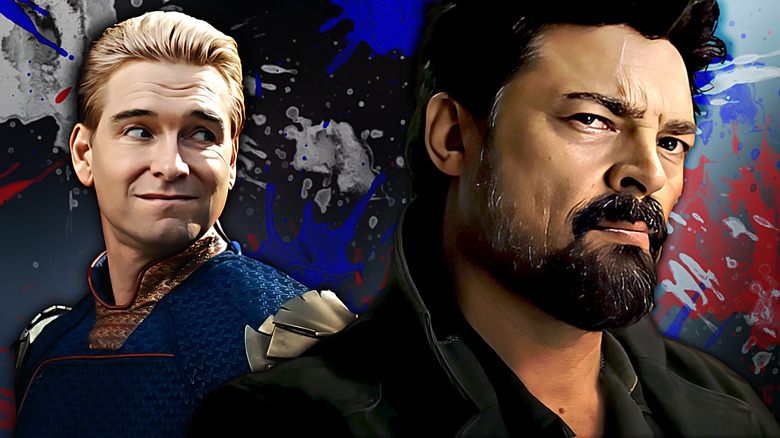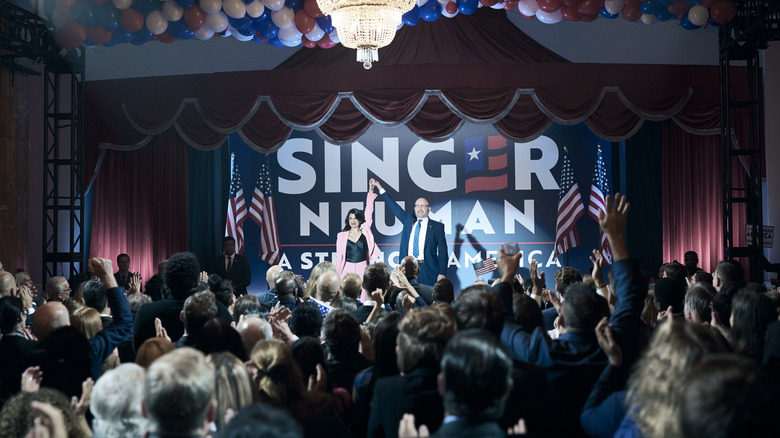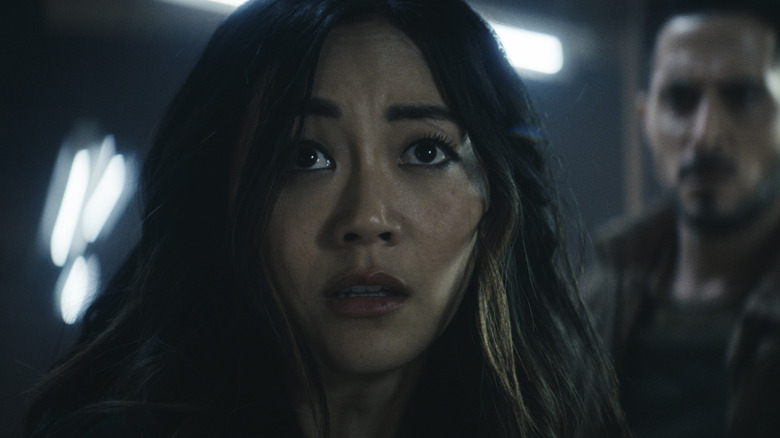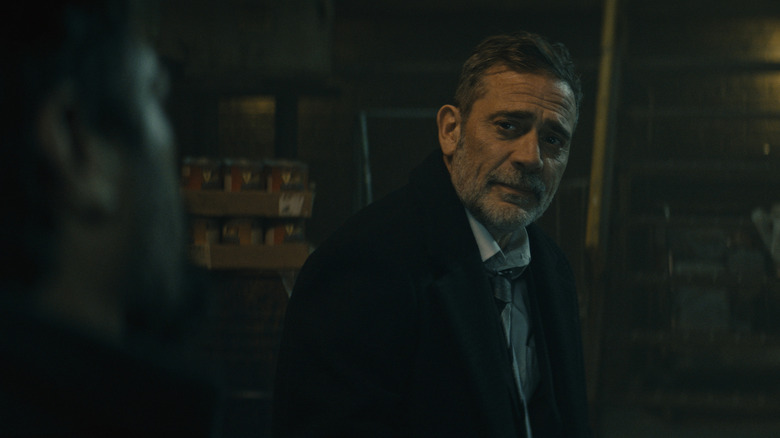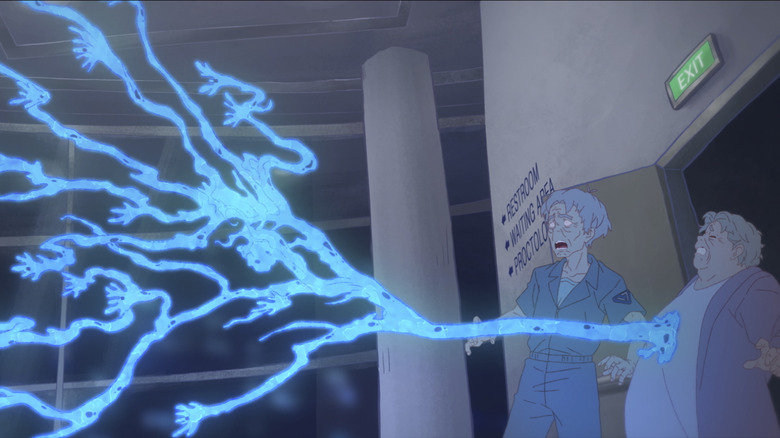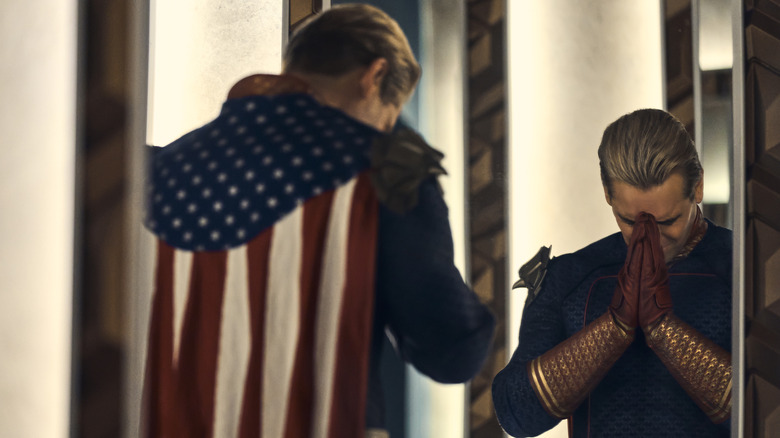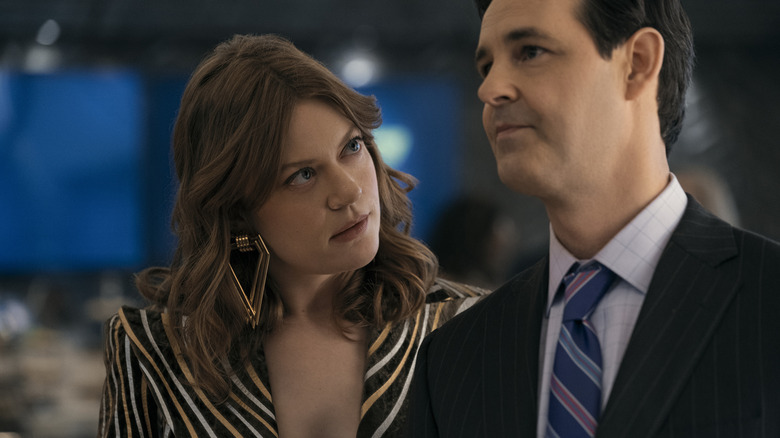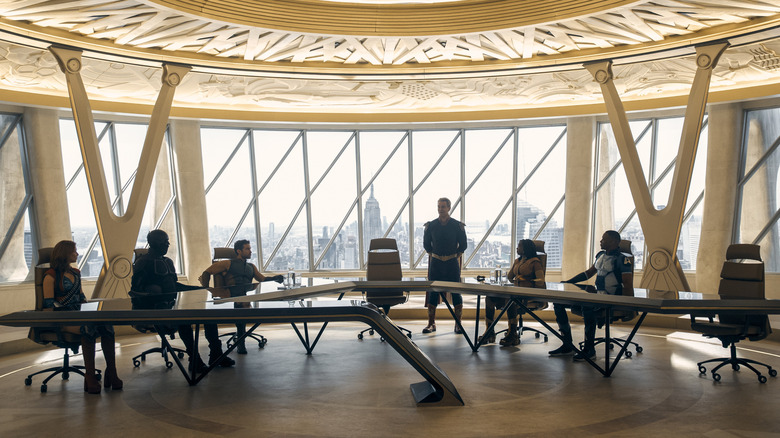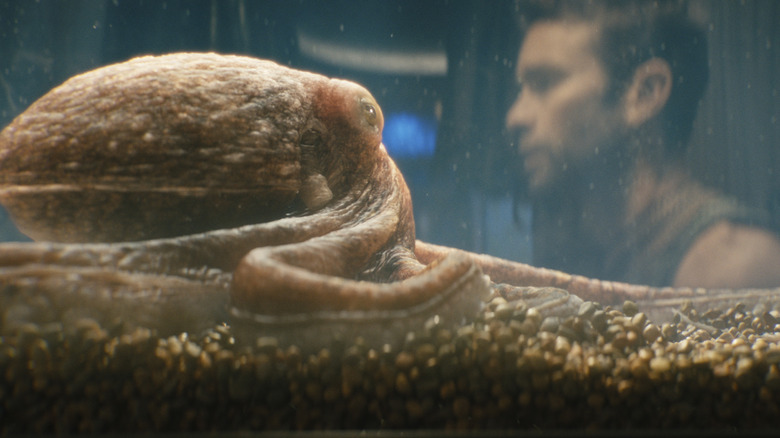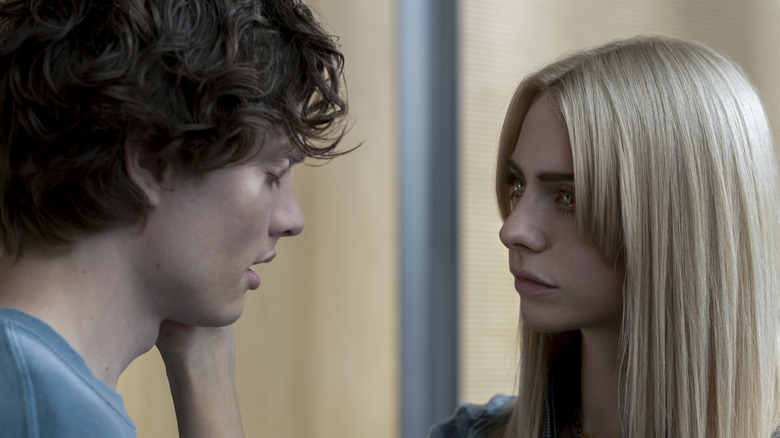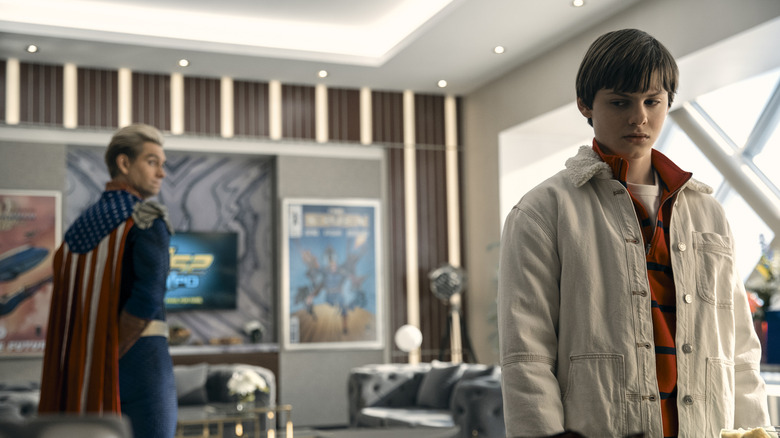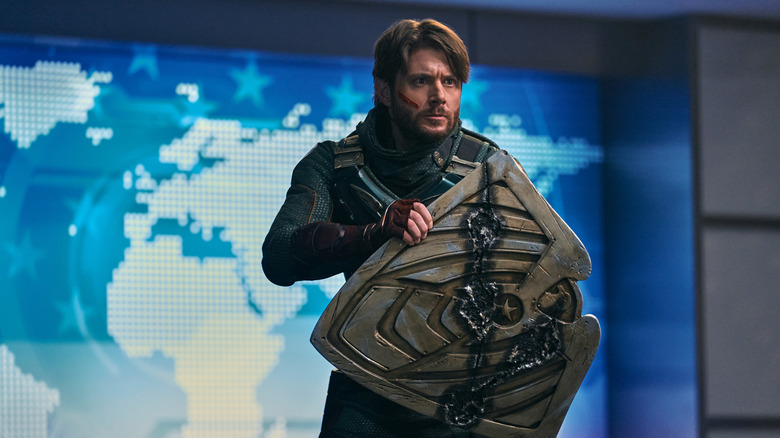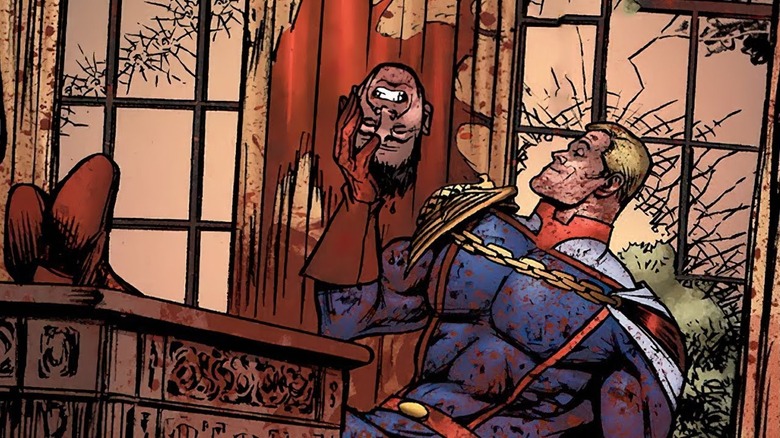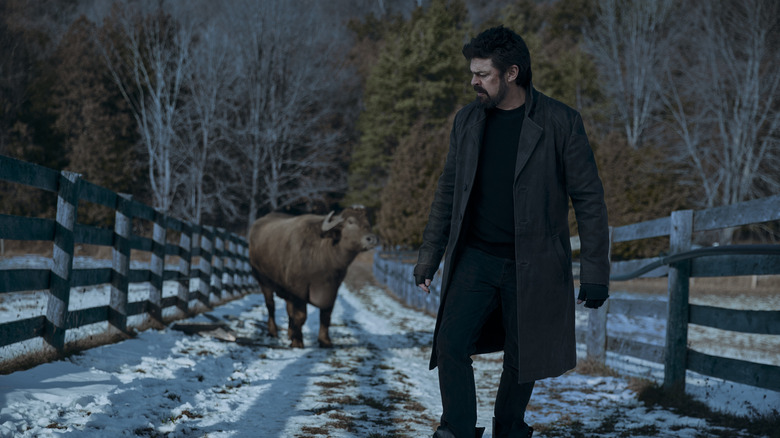The Ending Of The Boys Season 4 Explained
Contains spoilers for "The Boys" Season 4, Episode 8
And so we reach the end of yet another shocking, bloody, and downright diabolical season of Amazon Prime Video's "The Boys," if nothing else proving yet again that there are a near-infinite amount of ways to ruin our favorite Marvel and DC superheroes for good (so much so that some fans see the emphasis on shock value as a growing problem).
More than that, Season 4 took every story thread the series has established since 2019 and ran with them in so many bizarre and unexpected ways that we're not sure even Web-Weaver could make any sense of it. That's not to say that "The Boys" is necessarily more illogical than it's ever been, but that — as the series clearly builds to what will likely be a chaotic, messy season-long ending in Season 5, which will be its last — the story has gotten so complicated that it may be difficult to track without a complete rewatch. But until enough time for that opens up in your summer viewing schedule, we're here to take you through all the major beats of "The Boys" Season 4, explaining how they came to be while exploring what they could mean for the series going forward.
What you need to remember about the plot of The Boys Season 4
There are essentially three major plotlines that tie Season 4 of "The Boys" together. The major overarching threat is Victoria Neuman's (Claudia Doumit) ascension to the vice presidency, a title which the Boys have rightly assumed will only be temporary — especially once she forms a deadly alliance with Homelander (Antony Starr) and Vought.
Meanwhile, Homelander himself is in an existential battle of sorts with Father Time (no, we don't mean the Marvel Comics character). Facing the reality of ending his life with nothing to show for it but a few mediocre blockbusters, some fake fans from even faker rescues, and an impressive amount of unprosecuted murders, he now seeks to build a legacy both for himself and his son Ryan (Cameron Crovetti). This inspires him to form another unlikely alliance with "Sister" Sage (Susan Heyward), a reclusive Supe with the powers of unmatched intellect.
But as much as Homelander tries to remake the world and his son in his own image, Billy Butcher's (Karl Urban) pathological quest for vengeance persists. Having allowed this to destroy both his body and his relationship with Ryan in Season 3, Butcher is more desperate than ever to honor Becca's (Shantel VanSanten) memory as it continues to haunt him — though now in a much more literal sense.
What happened at the end of The Boys Season 4?
Whether caused by grief, trauma, the growing V-fueled tumor in his head, or all three, Butcher's mental state is in serious decline. What starts with vivid hallucinations of both his dead wife and former colleague Joe Kessler (Jeffrey Dean Morgan) ends with him descending completely into darkness — thanks in large part to some grotesque new superpowers. After fatally fumbling what appeared to be his last chance to bring Ryan back to the light, Butcher sets his sights on Neuman, who happens to be a breath away from negotiating an alliance with Hughie Campbell (Jack Quaid) and the rest of The Boys (now led by Laz Alonso's Mother's Milk).
As it turns out, The Boys are learning that beating up Supes isn't going to do very much if they ultimately can't stop Homelander. Alternatively, by recruiting Supes to their cause, they actually stand a chance at taking down the entire system. But while M.M. does successfully flip A-Train (Jesse T. Usher) and comes painfully close to bringing Neuman aboard too, Butcher intervenes and tears Neuman in two with his cancerous tendrils.
And while all our heroes are too busy fighting one another to focus on the real threat, Homelander and Sage manage to create the precise set of circumstances that will allow him to become America's "Caesar," starting with the removal of Robert Singer (Jim Beaver) from office. With the fascist-friendly Speaker of the House now in charge, Homelander is primed for world domination.
The Monkey in Billy Butcher's mind
While "The Boys" Season 4 was heavy on shocks, the biggest reveal was that Joe "The Monkey" Kessler — a mystery character that Jeffrey Dean Morgan and showrunner Eric Kripke have been teasing for over a year now — was nothing more than a figment of Butcher's tumor-boosted imagination. When you rewatch Season 4 from the top, it becomes painfully obvious (if it wasn't already) that Kessler only ever speaks directly to Butcher, and even seems to appear and disappear from scenes as the plot needs him — the first major instance of this being when "they" kill Ezekiel in Episode 3.
Though Kessler takes credit for this kill, implying that he is a sentient alter-ego of Butcher's who is capable of acting on his own (not unlike Tony Stark's sentient tumor "Anthony" from the Ultimate Marvel universe), the reality is likely that he's merely a manifestation of Butcher's worst impulses. This becomes immediately clear as the two "argue" over whether or not to take advantage of the Supe-killing virus.
While Butcher is initially swayed by the realization that a strain of the virus strong enough to kill Homelander would also become airborne and kill all Supes, Ryan included, Kessler is able to "convince" him by pointing out that his mere existence is evidence of Butcher's true desire. In other words, if Butcher did want to exterminate all Supes deep down, there wouldn't be a part of him literally fighting to do just that.
Butcher's new powers were created by... Andy Samberg?
Like a surprising amount of characters in "The Boys" Season 4, Butcher winds up developing brand new powers thanks to Compound V. As we tragically saw with Simon Pegg's Hugh Campbell, it only ends up strengthening the sickest parts of him.
Instead of regaining the super strength and heat vision he enjoyed in Season 3, Butcher is cursed with inhuman tendrils. Though it isn't thought of as canon, an identical circumstance to Butcher's occurs in an episode of "The Boys Presents: Diabolical" (written by Andy Samberg), wherein a Vought employee tries to save his wife from terminal cancer by injecting her with Compound V. While she doesn't get gross powers herself, it does turn her tumor into an independent, monstrous entity that attacks with its own massive tendrils.
The idea that Compound V could latch onto a tumor plays into the groundwork already laid with the Joe Kessler twist. Perhaps Kessler's a sentient tumor after all. On the other hand, the tendrils could be a visual nod to the emotionally parasitic supervillain Venom, implying that this is merely Butcher's metaphorical cancerous toxicity made manifest.
Is Homelander in his All-Star era?
Of all the parallels and homages to Marvel and DC superheroes, none have been quite as on the nose as the cues Homelander clearly takes from Superman. From his costuming and powers to the fake Midwestern origin story Vought tried to package him with, it's been one of the most reliable tropes on "The Boys" since Season 1. Yet Season 4 is the first season to feel like it's actually trying to tell a "Superman" story — or at least, one with the morals of an alley cat.
Rather than keep him as antagonist to The Boys, Season 4 gives him an independent mission to "save the world." The show provides him with two brand new supporting characters that play almost exclusively into his storyline, with Firecracker (Valorie Curry) being an all-too-friendly Jimmy Olsen-like cheerleader for Homelander while Sage takes on the role of his untrustworthy advisor — perhaps in the vein of Lex Luthor. The show even forces him to confront his own mortality, a sudden reality that comics writer Grant Morrison threw at the Man of Steel in "All-Star Superman."
But while great "Superman" stories are about the sort of selfless love that compels a man to fly into the sun to save his home, Homelander's is all about fear. Whether it's of death, loneliness, or the realization that the empty feeling inside of him will last forever, he will likely have to overcome it or die in Season 5.
What happened to Ashley Barrett?
Speaking of "Superman" parallels, it's possible Homelander even managed to create his own Doomsday in "The Boys" Season 4. Privy to all manner of confidential world-ending plans and well aware that her usefulness as Vought and Homelander's public puppet has all but evaporated, hapless faux-CEO Ashley Barrett (Colby Minifie) finds her golden parachute in the form of a free dose of Compound V (courtesy of Homelander's private stash). Unfortunately for her, the result of this injection appears to have monstrous side effects.
We sadly don't get much of a look at what Ashley transforms into, but it appears that the size of her body increases, her physical make-up is drastically altered, she may be sprouting some feathers, and — rather ironically — what's left of her hair falls out.
On the one hand, this could also likely be building up to nothing more than a cruel joke, as the show's writers have proven time and again that they enjoy comedically subverting expectations. However, if she is becoming some kind of super-powerful monster like Doomsday, it would make the most dramatic sense that she be as strong as, if not stronger than, Homelander, and might even be the one to ultimately rob Butcher of that kill he so desires. As for her immediate future, becoming a Supe might be enough for Homelander to accept her as one of them. Maybe.
Everyone at Vought is dead
Lrt's have a moment of silence for Anika (Ana Sani), Ashley (Sabrina Saudin), and the rest of the Vought International corporate employees killed during Homelander's season of rampage and eventual consolidation of power. As part of his plan to cement himself as the supreme ruler of the world, it appears as though he needs to both ensure that Vought is a Supe-first company and free himself (and his Supe allies) of any human interference — not that they've had much power to interfere since Season 2.
Symbolically, however, the Vought Tower massacre feels like the true death of Vought as a company. Madelyn Stillwell (Elisabeth Shue) is dead; Stan Edgar (Giancarlo Esposito) is a fugitive from justice; and Ashley Barrett is probably no longer fit to be the face of the company. Meanwhile, the Godolkin University administrators are basically all dead.
The company that only existed to create and manage superheroes is now being run exclusively by those very superheroes — effectively making Vought a thing of the past. If Homelander does choose a successor to Ashley to keep the company running in spirit, our money is on The Deep (Chace Crawford).
A-Train and The Deep finally become who they're meant to be
Aside from Homelander, A-Train and The Deep are the only remaining members of The Seven — and really the Vought coalition at large — who audiences have been invested in since Season 1. Ironically, while the debut outing of "The Boys" saw the former as a less sympathetic villain willing to kill anyone to stay at the top of his game and the latter as a vile but obviously broken and potentially even redeemable outcast, the two have now completely switched places as they reach the end of their parallel journeys.
Having been righteously ostracized from The Seven following his assault of Annie January/Starlight (Erin Moriarty), The Deep chooses to auction off every available piece of his soul in order to one day crawl back into Vought Tower. Now that he's there, however, it appears he has hollowed out so much of his soul that no identity remains but a religious dedication to Homelander. Eating Timothy in Season 3 solidified his place under Homelander's boot — killing Ambrosius proved that he now depends on that position for any semblance of meaning.
Meanwhile, A-Train crossing the moral finish line and joining The Boys feels completely justified, given the personal revelations he experienced in Season 3. Sadly, the series seems to be telegraphing pretty clearly that changing sides will cost him dearly in the end.
The Guardians of Godolkin may get a promotion
Though they don't get a ton of screen time, it was fun to see Sam Riordan (Asa Germann) and Cate Dunlap (Maddie Phillips) from "Gen V" pop up for a few scenes throughout Season 4. Most notable among their appearances were Homelander's eerily clandestine meeting of Supes at Vought Tower, as well as their ultimate confrontation with Kimiko (Karen Fukuhara) and Frenchie (Tomer Capone). Both of these instances together could indicate that the good ol' Guardians of Godolkin may be graduating to The Seven.
By the end of Season 4, all that remains of Vought's premiere super team are Homelander, The Deep, Sage (perhaps in an unofficial advisory capacity), Firecracker (albeit weakened by lactation meds), and "Black Noir." With A-Train on the run and Tek Knight (Derek Wilson) very much dead, the most plausible additions to finally round out the team would be Sam and Cate — that is, unless Eric Kripke decides to fill those spots with new cast members like Jared Padalecki (if Kripke agrees to Padalecki's one condition for joining the show). Alternatively, it's just as likely that Homelander dissolves The Seven as unnecessary in the face of his political ambitions.
The world needs a savior it doesn't have
For the entirety of Season 4, Butcher is torn between two options when it comes to Ryan: do the unthinkable and trust him — a Supe — to save the world, or kill him before he becomes a more dangerous threat than Homelander. By the end of Season 4, he seems to have come around to the latter, bringing Ryan to his death bed in a CIA base to urge him to switch sides. The plan — which includes suddenly revealing to a child that his last living relative is a psychopath he needs to murder — goes so well that Ryan kills Grace Mallory (Laila Robins), raising his accidental kill count to three.
Though Butcher allows him to leave the facility, it clearly isn't because he's realized Ryan needs to make his own choices. By killing Grace almost in the same way he killed Becca, it's likely Ryan proved to Butcher that no Supe was deserving of mercy, and that they all need to be exterminated in order for the world to be safe for regular humans. Ryan, meanwhile, has a ridiculous amount of ground to cover maturity-wise if he's going to be of any use to either side during the dystopia currently on the horizon.
Soldier Boy is back
In a post-credits reveal (that wasn't really so much of a "reveal" as it was the show saying, "yup, still there!") fans finally got their first look at Jensen Ackles' Soldier Boy since he popped up in the premiere season of "Gen V." After his catastrophic battle with Queen Maeve (Dominique McElligott) in the Season 3 finale of "The Boys," Homelander's kinda-father was put back in stasis under the watchful eye of the U.S. government. Now that Homelander is in control of that government, Soldier Boy has become his problem.
On the one hand, Homelander could just leave him there. It would be sort of hilarious as a subversion of post-credits scene tropes, but ultimately unlikely given how much the fan base loves Ackles and Soldier Boy. That said, it's really difficult to envision how he fits into the story at this point, given how complete his storyline was in Season 3.
How did the comic book end?
After Black Noir's shocking death in the Season 3 finale, many fans of the original "The Boys" comic book series wondered how the show would further deviate from how the comic book ended. As readers may be aware, it is ultimately revealed in the aftermath of Homelander's attack on Washington that Black Noir was secretly a clone of Homelander the whole time and was responsible for many of his crimes throughout the entire series (including the assault of Butcher's wife).
The two fight each other to a mutual demise, after which the U.S. military swiftly massacres the remaining Supes on Homelander's side. A nihilistic Butcher then attempts to satiate his need for vengeance by releasing the Supe-killing virus, killing Kimiko, Frenchie, and M.M. in the process. He is ultimately stopped by Hughie and is briefly paralyzed from an accidental fall before Hughie eventually kills him. While Eric Kripke's ending might evoke the spirit or tone of this conclusion, he's changed so much from the comics that his ending will surely be different too.
What does the end of The Boys Season 4 mean for the franchise?
If you previously expected "The Boys" to have a happy ending, it's likely that Season 4 changed your mind. By this point, America as a country is so broken it's hard to see how it can be put back together.
Chances are that a majority of the cast won't make it through the series finale — though our money is on A-Train, Butcher, Mother's Milk, and The Deep in terms of specific deaths. Homelander might actually survive, lest they risk undermining the major theme of "violence is bad" they've perplexingly introduced after four seasons of blood.
And while Hughie and Annie might get to ride off into the sunset, it's equally likely that Vought (the symbol of America's most messed-up systems) will somehow rise from the ashes of Homelander's reign — potentially led by a retroactively absolved Stan Edgar. All that said, it's always been near-impossible to predict where Eric Kripke is taking the story, so we'll just have to wait for Season 5 to premiere.
